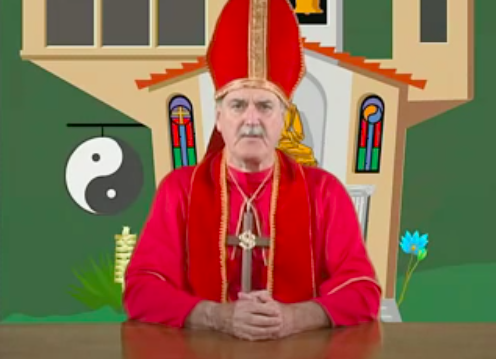God has a sense of humour, and our sense of humour lightly mirrors God’s. The best humour is that which reveals truth about ourselves, and the Bible is full of humour – much of which many people miss because they eschew laughter with spirituality – or are just plain scared of the truth about themselves being revealed.
John Cleese (JC) has a new YouTube Channel, and one of his first videos (above) is the foundation of the Church of JC Capitalist. It has obvious echoes of John Oliver’s Our Lady of Perpetual Exemption, an actually legally recognized church in the United States.
JC is clearly e-Cleese-iastical, but whether or not he is the actual me$$iah or just a very naughty boy remains to be seen.
One thing hit home: morals are only about sex.
If you appreciated this post, consider liking the liturgy facebook page, and/or signing up for a not-very-often email, …




I absolutely love John Cleese! And it’s quite funny that I’m seeing this now, I’m actually trying to create a religion!
I’m currently working on constructing a language (similar to what Tolkien did with Elvish) and I’ve been trying to imbue this language with a degree of culture. For example, while there is a word for silver in my language, there is no word for lead (a byproduct of silver smelting), which would suggest that the speakers of my language traded for silver rather than making it themselves.
I think religion is a great reflection of how a given group of people view the world and their place in it, so I thought it would be an essential thing to create. Plus, there are plenty of English words with religious roots – “Panic” comes from the Greek “panikon”, which derives from the god Pan and his tendency to shout and cause animals to stampede if awoken from his noontime nap. I think it’d be quite fun to create words with similar etymologies!
Thanks, Michael.
I was in a bookshop recently in which I saw a book about made-up languages. Sorry – I can’t remember the name of it, but I suspect you would find it useful/fascinating.
We’re all watching more sport currently – and I wonder about sport being able to do what religion seems not to be able to do (or actually make worse).
Blessings.
If you ever come across that book again, do tell me its title. I’m nearly finished with my language’s phonology, and I sense that creating a proper grammar will be quite difficult. Any sort of guide will be extremely helpful. Also, since I’m no theologian, I was wondering if it might be possible to email you to discuss some ideas for this religion I’m working on. I have a bit of an outline for it, but I’m not sure how to make it something that you might find people actually believing in. I would really appreciate your help!
I would argue that sports are much better at unifying a group of people than religion is. Religion seems to be so easily fragmented; Small doctrinal differences can divide or even cause a full-blown schism, and the hostilities that result can make reconciliation difficult. The goal in any sport is simply to win, and I think it’s for this reason that sports teams are so easy to support. There’s no requirement that you must believe in X or agree with Y, anybody can back a team. And when rivalries occur (which they often do) it’s never an ideological difference. It’s usually about MY town/city/state/country being better than YOUR town/city/state/country. It’s a matter of pride. I’d love to hear your thoughts on this.
Michael, I wonder if this is the book I saw: The Art of Language Invention: From Horse-Lords to Dark Elves, the Words Behind World-Building by David J. Peterson. You can email me if you like – depending on how much there is, I may only be able to glance at it. I might develop my ideas on sport into a post. Blessings.
Oh wow! I’ve actually talked to the author of this book!
I take his point but from John Cleese, I was expecting something a bit more…well, funny. That’s not satire, it’s reality.
John Oliver did something similar in the U.S. of A, to demonstrate the rip off televangelists, by actually forming a “church” and inviting donations as “seed faith”. The money poured in. Eventually he disbanded his “church” and gave the money to a charity. Catch it on You Tube.
Yes, Janet. There’s a link to John Oliver’s church in my post above. Blessings.
Thanks Janet – like you, I expected this to be funny but it was too accurate to be that… Blessed are the poor, so we don’t need to worry about them…!
Dear Bosco, congrats on getting this item onto the U.K. blog ‘Thinking Anglicans’ it certainly makes us all think again about the efficacy of the ‘Prosperity Gospel’ theologians. Incidentally, have you sent a copy to Bishop Brian Tamaki, of our very own ‘Destiny Church’? He could probably take a leaf out of the John Cleese new-gospel.